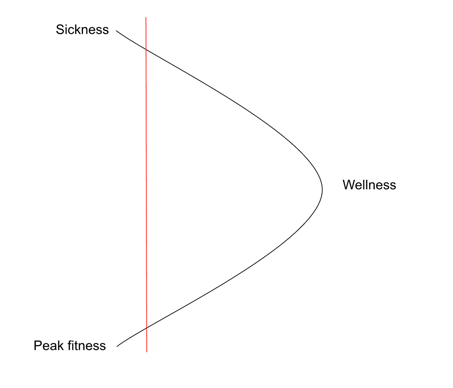From Burnout to Balance: Rethinking Peak Performance
I take a look at how shifting from an extreme, competition-driven mindset to focusing on sustainable health and incremental progress transformed my fitness journey. Recognizing the difference between training and competing, I want to highlight the value of small, daily habits that lead to long-term success.


Throughout my athletic career, I equated peak physical performance with the opposite of sickness—its mirror image, in an ironic way. I was chronically fatigued, stressed, and dealing in extremes as I pursued peak performance. Over the past couple of months, I have been trying to think of a fitness philosophy that not only better represents peak performance but is also sustainable. My six weeks in Lake Placid helped me shift my perspective on health and performance, understand the distinction between training and competing, and recognize the power of small, consistent effort.
The figure shows my previous thoughts on health and performance I learned from CrossFit. To achieve peak fitness, one had to cross a threshold and sacrifice health for performance; wellness fell somewhere in between sickness and peak fitness. The metrics I was measuring were improving, so I was okay with hurting every day (these were short-term improvements, and I’m now in the process of retraining how my body uses its energy systems, but that’s a post for another time). I justified my lack of a social life as “prioritizing my health” (it turns out isolating oneself is not healthy). I’m not here to bash CrossFit; it’s the sport I first fell in love with, and I wouldn’t be here today without it. I’m not bashing on the coaching staff either. I was deep in the Kool-Aid and might have overinterpreted this diagram. These were glimpses of overtraining, and I ended up digging myself into a hole so deep that it led to a two-and-a-half-year burnout.
Today, I believe that systemic health is the foundation for peak performance. One cannot achieve peak performance without first mastering the fundamentals of health: sleep, nutrition, mental health, and stress management. It’s still common to find elite athletes who are digging themselves into a hole or subscribing to a toxic “shut up and do it” attitude, but the best of the best—those at the top—are balancing systemic health and the physical stress of peak performance on a knife’s edge. Too much training stress, and they fall into sickness (injury, burnout, etc.); too little, and they won’t be able to compete with the rest. It’s an insanely difficult task with no margin for error. The elite tailor their lives to sustain this balancing act, and while it’s motivating to see this superhuman feat, they have a massive support team helping them hold this balance.
The problem was that I tried to copy the pros and reach my physical peak without understanding the necessary balance. I redlined every training session to feel accomplished, copying the workouts of elite cyclists. Elite cyclists need these high-intensity (zone 4-5) workouts to reach their desired fitness level because they've already maxed out their aerobic capacity. I, on the other hand, needed to develop an aerobic base, but my ego led me to believe that going slow was useless. Ultimately it came to a lack of self-confidence to hold back my ego. I don’t have to prove anything to anyone in training. I learned the difference between training and competing the hard way. Training is all about consistency, gradual improvement, and building a strong foundation; the uncertainty is low, and workouts are within ranges you know you can hit, targeting specific areas of fitness you want to improve. Competing, however, involves pushing limits, testing peak performance, and measuring oneself against a standard or others; uncertainty is high–competing is a platform for self discovery. You train to compete, staying within your limits and gradually boosting performance (over years in endurance sports) to prepare to push those limits during competition. When every workout becomes a mini-competition due to a lack of confidence in the process, burnout, injuries, and stalled progress often follow.
In no way have I cracked the code or solved fitness for myself. Even as I write this post, there are so many questions of self-doubt that run through my head: am I training enough, are my key sessions right, have I periodized correctly? I read a quote from Sahil Bloom and he said, “anything above zero compounds positively” and I’ve been really trying to take that to heart. Developing micro-habits and consistency is what led to my mental and physical transformation. By focusing on and making small digestible daily goals, I’ve been able to build momentum. Even if I only bike a quarter of my planned session, it’s better than doing nothing at all–and it’s more than I was doing six months ago. I think we as athletes have grand aspirations and start to fixate on gains and improvements that are equally grand, if not bigger. Every training session has to produce a massive leap of fitness or a record-breaking performance but we should be focusing on an extra rep, adding vegetables to a meal, or an extra glass of water. These small wins start to accumulate and snowball into tangible changes.
Looking back on the past six months, shifting my perspective, recognizing the difference between training and competing, and looking to make baby steps have all made me appreciate their impact on my daily life. As corny as it sounds, once training did not equate to competing, I began to enjoy the process again. My understanding of health evolved because I wasn’t caught up on the immediate outcomes and saw the value of sustained, incremental improvement.
All I want you to take away from this is: health is a long-term, evolving journey not a one off sprint. Truly understanding the difference between training, as a consistent, ongoing effort, and competing, as a form of self discovery, is the key. And remember, small, consistent efforts compound into those big, meaningful changes over time.
I’ll wrap up with this: What tiny step can you take today that will positively compound into meaningful progress tomorrow?
